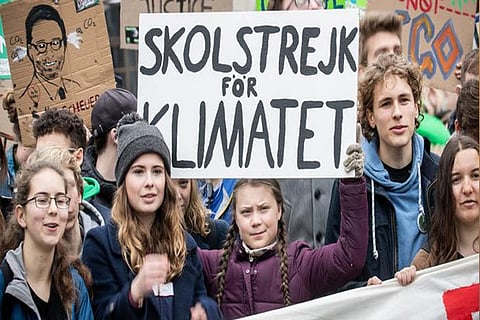

Chennai
Renee Karunungan, an environmental campaigner from the Philippines, says being an activist leaves you “exposed” and an easy target for online hate. And she would know. “I’ve had a lot of comments about my body and face,” she says, “things like ‘you’re so fat’ or ‘ugly’,” she says. “But also, things like ‘I will rape you’.” There isn’t much data on online abuse against environmentalists. But Karunungan is one of many saying it’s on the rise. As it becomes woven into the fabric of digital life, we sometimes forget the impact a single comment can have, Karunungan says: “The trauma that an activist feels - it is not just ‘online’, it is real. It can get you into a very dark place.”
Platforms like TikTok and Facebook have begun responding to calls for stricter regulation for stricter regulations. But what exactly needs to be regulated and how is fraught. Defining when abuse becomes hate speech, and when hate speech becomes illegal incitement to violence, differs between countries and platforms - and is increasingly up for debate. “There is also a huge gray zone,” says Josephine Schmitt, researcher on hate speech at the Centre for Advanced Internet Studies, and definitions can be “very subjective.”
While no international legal definition exists, the UN describes hate speech as communication attacking people or a group “based on their religion, ethnicity, nationality, race, colour, descent, gender or other identity factor.” According to several researchers and activists, environmental campaigning also serves as an identifying factor that attracts hate. “Environmental defenders are attacked because they serve as a projection surface for all kinds of group-based enmity,” says Lorenz Blumenthaler of the anti-racist Amadeu Antonio Foundation.
Attacks vs political debate
Blumenthaler says his foundation has seen an “immense increase” in hate speech against climate activists in Germany - and particularly against those who are young and female. This year Luisa Neubauer, prominent organiser of Germany’s Fridays for Future movement, won a court case regarding hateful comments she received online. This came after far-right party Alternative fur Deutschland’s criticisms of Greta Thunberg included likening her to a cult figure and mocking her autism.
That attacks on climate activists are often highly personal and largely empty of actual arguments is partly a sign that “the right hasn’t found a real way to address climate change” or “develop a narrative of their own,” says Blumenthaler. But deployed as “part of a whole toolkit” including “defamation, misinformation, hate speech, the threat and inciting of violence,” hate speech can be an effective way to intimidate and silence activists, according to Lara Wodtke from the program for international democracy of the Heinrich Boll Foundation.
In Bolsonaro’s Brazil, for example, Mary Menton, environmental justice research fellow at Sussex University, says in there is often a fine line between hate speech and smear campaigns.
She has seen an increase in the use of fake news and smear campaigns - on both social and traditional media - aiming to discredit the character of Indigenous leaders or make them look like criminals. Coming from high-level sources, as well as local lobbies and rural conglomerates, these attacks create an atmosphere of impunity for attacks against these Indigenous activists, Menton says, while for activists themselves, “it creates the sense there is a target on their backs.”
That’s a feeling Mitzi, organiser of Youth Advocates for Climate Action in the Philippines, knows well. “It’s gotten to the point that sometimes I’m paranoid that if I’m commuting home someone could be following me,” she says. “We’re all always on the lookout.”
— This article has been provided by Deutsche Welle
Visit news.dtnext.in to explore our interactive epaper!
Download the DT Next app for more exciting features!
Click here for iOS
Click here for Android